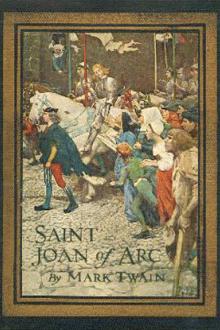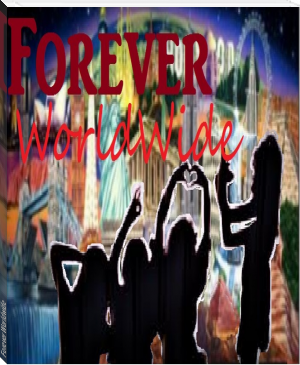Personal Recollections of Joan of Arc, vol 1, Mark Twain [read novel full TXT] 📗

- Author: Mark Twain
- Performer: -
Book online «Personal Recollections of Joan of Arc, vol 1, Mark Twain [read novel full TXT] 📗». Author Mark Twain
Chapter 17 Sweet Fruit of Bitter Truth
WHEN WE got home, breakfast for us minor fry was waiting in our mess-room and the family honored us by coming in to eat it with us. The nice old treasurer, and in fact all three were flatteringly eager to hear about our adventures. Nobody asked the Paladin to begin, but he did begin, because now that his specially ordained and peculiar military rank set him above everybody on the personal staff but old D’Aulon, who didn’t eat with us, he didn’t care a farthing for the knights’ nobility no mine, but took precedence in the talk whenever it suited him, which was all the time, because he was born that way. He said:
“God be thanked, we found the army in admirable condition I think I have never seen a finer body of animals.”
“Animals!” said Miss Catherine.
“I will explain to you what he means,” said No�l. “He—”
“I will trouble you not to trouble yourself to explain anything for me,” said the Paladin, loftily. “I have reason to think—”
“That is his way,” said No�l; “always when he thinks he has reason to think, he thinks he does think, but this is an error. He didn’t see the army. I noticed him, and he didn’t see it. He was troubled by his old complaint.”
“What s his old complaint?” Catherine asked.
“Prudence,” I said, seeing my chance to help.
But it was not a fortunate remark, for the Paladin said:
“It probably isn’t your turn to criticize people’s prudence—you who fall out of the saddle when a donkey brays.”
They all laughed, and I was ashamed of myself for my hasty smartness. I said:
“It isn’t quite fair for you to say I fell out on account of the donkey’s braying. It was emotion, just ordinary emotion.”
“Very well, if you want to call it that, I am not objecting. What would you call it, Sir Bertrand?”
“Well, it—well, whatever it was, it was excusable, I think. All of you have learned how to behave in hot hand-to-hand engagements, and you don’t need to be ashamed of your record in that matter; but to walk along in front of death, with one’s hands idle, and no noise, no music, and nothing going on, is a very trying situation. If I were you, De Conte, I would name the emotion; it’s nothing to be ashamed of.”
It was as straight and sensible a speech as ever I heard, and I was grateful for the opening it gave me; so I came out and said:
“It was fear—and thank you for the honest idea, too.”
“It was the cleanest and best way out,” said the old treasurer; “you’ve done well, my lad.”
That made me comfortable, and when Miss Catherine said, “It’s what I think, too,” I was grateful to myself for getting into that scrape.
Sir Jean de Metz said:
“We were all in a body together when the donkey brayed, and it was dismally still at the time. I don’t see how any young campaigner could escape some little touch of that emotion.”
He looked about him with a pleasant expression of inquiry on his good face, and as each pair of eyes in turn met his head they were in nodded a confession. Even the Paladin delivered his nod. That surprised everybody, and saved the Standard-Bearer’s credit. It was clever of him; nobody believed he could tell the truth that way without practice, or would tell that particular sort of a truth either with or without practice. I suppose he judged it would favorably impress the family. Then the old treasurer said:
“Passing the forts in that trying way required the same sort of nerve that a person must have when ghosts are about him in the dark, I should think. What does the Standard-Bearer think?”
“Well, I don’t quite know about that, sir. I’ve often thought I would like to see a ghost if I—”
“Would you?” exclaimed the young lady. “We’ve got one! Would you try that one? Will you?”
She was so eager and pretty that the Paladin said straight out that he would; and then as none of the rest had bravery enough to expose the fear that was in him, one volunteered after the other with a prompt mouth and a sick heart till all were shipped for the voyage; then the girl clapped her hands in glee, and the parents were gratified, too, saying that the ghosts of their house had been a dread and a misery to them and their forebears for generations, and nobody had ever been found yet who was willing to confront them and find out what their trouble was, so that the family could heal it and content the poor specters and beguile them to tranquillity and peace.
ABOUT NOON I was chatting with Madame Boucher; nothing was going on, all was quiet, when Catherine Boucher suddenly entered in great excitement, and said:
“Fly, sir, fly! The Maid was doing in her chair in my room, when she sprang up and cried out, ‘French blood is flowing!—my arms, give me my arms!’ Her giant was on guard at the door, and he brought D’Aulon, who began to arm her, and I and the giant have been warning the staff. Fly!—and stay by her; and if there really is a battle, keep her out of it—don’t let her risk herself—there is no need—if the men know she is near and looking on, it is all that is necessary. Keep her out of the fight—don’t fail of this!”
I started on a run, saying, sarcastically—for I was always fond of sarcasm, and it was said that I had a most neat gift that way:
“Oh, yes, nothing easier than that—I’ll attend to it!”
At the furthest end of the house I met Joan, fully armed, hurrying toward the door, and she said:
“Ah, French blood is being spilt, and you did not tell me.”
“Indeed I did not know it,” I said; “there are no sounds of war; everything is quiet, your Excellency.”
“You will hear war-sounds enough in a moment,” she said, and was gone.
It was true. Before one could count five there broke upon the stillness the swelling rush and tramp of an approaching multitude of men and horses, with hoarse cries of command; and then out of the distance came the muffled deep boom!—boom-boom!—boom! of cannon, and straightway that rushing multitude was roaring by the house like a hurricane.
Our knights and all our staff came flying, armed, but with no horses ready, and we burst out after Joan in a body, the Paladin in the lead with the banner. The surging crowd was made up half of citizens and half of soldiers, and had no recognizedleader. When Joan was seen a huzza went up, and she shouted:
“A horse—a horse!”
A dozen saddles were at her disposal in a moment. She mounted, a hundred people shouting:
“Way, there—way for the MAID OF ORLEANS!” The first time that that immortal name was ever uttered—and I, praise God, was there to hear it! The mass divided itself like the waters of the Red Sea, and down this lane Joan went skimming like a bird, crying, “Forward, French hearts—follow me!” and we came winging in her wake on the rest of the borrowed horses, the holy standard streaming above us, and the lane closing together in our rear.
This was a different thing from the ghastly march past the dismal bastilles. No, we felt fine, now, and all awhirl with enthusiasm. The explanation of this sudden uprising was this. The city and the little garrison, so long hopeless and afraid, had gone wild over Joan’s coming, and could no longer restrain their desire to get at the enemy; so, without orders from anybody, a few hundred soldiers and citizens had plunged out at the Burgundy gate on a sudden impulse and made a charge on one of Lord Talbot’s most formidable fortresses—St. Loup—and were getting the worst of it. The news of this had swept through the city and started this new crowd that we were with.
As we poured out at the gate we met a force bringing in the wounded from the front. The sight moved Joan, and she said:
“Ah, French blood; it makes my hair rise to see it!”
We were soon on the field, soon in the midst of the turmoil. Joan was seeing her first real battle, and so were we.
It was a battle in the open field; for the garrison of St. Loup had sallied confidently out to meet the attack, being used to victories when “witches” were not around. The sally had been reinforced by troops from the “Paris” bastille, and when we approached the French were getting whipped and were falling back. But when Joan came charging through the disorder with her banner displayed, crying “Forward, men—follow me!” there was a change; the French turned about and surged forward like a solid wave of the sea, and swept the English before them, hacking and slashing, and being hacked and slashed, in a way that was terrible to see.
In the field the Dwarf had no assignment; that is to say, he was not under orders to occupy any particular place, therefore he chose his place for himself, and went ahead of Joan and made a road for her. It was horrible to see the iron helmets fly into fragments under his dreadful ax. He called it cracking nuts, and it looked like that. He made a good road, and paved it well with flesh and iron. Joan and the rest of us followed it so briskly that we outspeeded our forces and had the English behind us as well as before. The knights commanded us to face outward around Joan, which we did, and then there was work done that was fine to see. One was obliged to respect the Paladin, now. Being right under Joan’s exalting and transforming eye, he forgot his native prudence, he forgot his diffidence in the presence of danger, he forgot what fear was, and he never laid about him in his imaginary battles in a more tremendous way that he did in this real one; and wherever he struck there was an enemy the less.
We were in that close place only a few minutes; then our forces to the rear broke through with a great shout and joined us, and then the English fought a retreating fight, but in a fine and gallant way, and we drove them to their fortress foot by foot, they facing us all the time, and their reserves on the walls raining showers of arrows, cross-bow bolts, and stone cannon-balls upon us.
The bulk of the enemy got safely within the works and left us outside with piles of French and English dead and wounded for company—a sickening sight, an awful sight to us youngsters, for our little ambush fights in February had been in the night, and the blood and the mutilations and the dead faces were mercifully dim, whereas we saw these things now for the first time in all their naked ghastliness.
Now arrived Dunois from the city, and plunged through the battle on his foam-flecked horse and galloped up to Joan, saluting, and uttering handsome compliments as he came. He waved his hand toward the distant walls of the city, where a multitude of flags were flaunting gaily in the wind, and said the populace were up there observing her fortunate performance and rejoicing over it, and added that she and the forces would have a great





Comments (0)